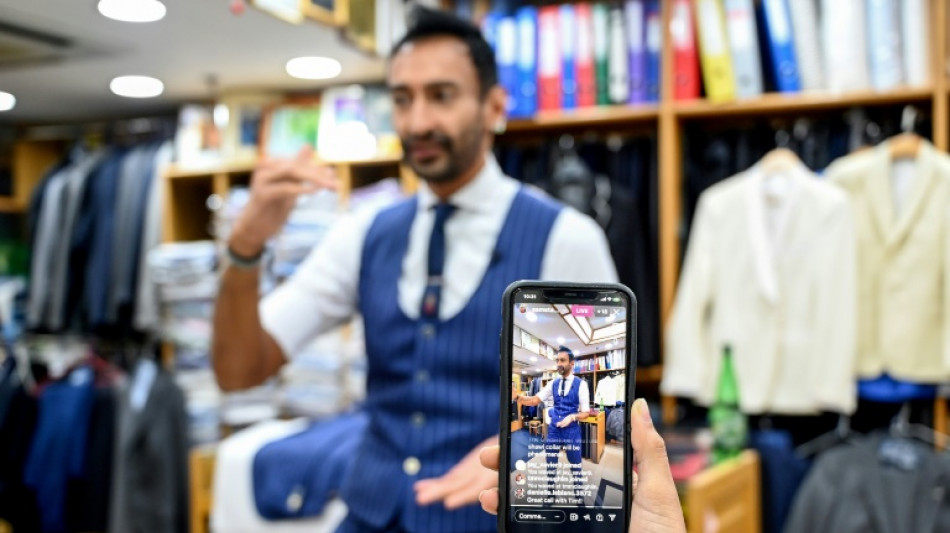
RBGPF
62.2800


Assistants wielding multiple livestreaming mobile phones are now as crucial to Roshan Melwani's tailor shop as the measuring tapes, needles and fabrics that have made his Hong Kong family business so famous.
The Melwani family has dressed everyone from American presidents to aristocrats and celebrities over the decades.
But the pandemic nearly sunk them -- and many of Hong Kong's once thriving tailoring businesses have not survived.
Few places remained internationally cut-off during the coronavirus pandemic for as long as Hong Kong, a self-imposed isolation that the city's government has only begun to lift in the last two months.
As a result, Melwani's shop Sam's Tailors has been reliant on online sales for most of the last 2.5 years, long after rivals in Saville Row, Milan and New York reopened their doors.
"Understand that if I did not have 60 years of cash behind me, I could not operate," Melwani, a third-generation tailor, tells AFP as a frenetic day of video calls with customers and livestreams to showcase new designs gets underway.
"Pre-pandemic I had a minimum 20 people that I would work with per day, sometimes 40 people, up to six days a week."
- Quality and speed -
Tim, a client in the United States, is the kind of customer that has helped keep Sam's Tailor afloat.
During the pandemic, he ordered an entire new wardrobe and now he's on the look-out for something more daring.
With the help of assistants broadcasting a dizzying array of choices over video call, Melwani steers Tim towards a burgundy three-piece with an inner lining featuring pin-up girls.
"Yeah, let's get to it," Tim says over the phone as assistants frantically jot down all the extra details in yellow notebooks.
Before the pandemic Hong Kong's tailors were a must-visit for many tourists thanks to their reputation for quality -- and their ability to turn a bespoke suit around as little as 24 hours.
The walls of Sam's Tailors are festooned with photos of famous patrons, from Bill Clinton, George Bush and Boris Johnson, to Bruno Mars, Russel Crowe and Meghan Markle.
The city's tailoring scene traces its origins back to Shanghai, which was renowned for its quality and craftmanship at the start of the twentieth century.
Many of those tailors relocated to Hong Kong in the aftermath of the Chinese Communist Party's civil war victory in 1949.
"People can get 10 suits in Hong Kong with the frequency they get one suit in Saville Row," Andy Chan, President of the Hong Kong Tailors Association, told AFP.
"This is why everybody came to Hong Kong to get a custom-made suit for them."
- Tourist desert -
In recent years Hong Kong's tailoring industry has struggled against fast fashion and online sales. But the pandemic has been especially brutal.
Hong Kong went from welcoming 65 million people in 2018 to just 91,000 in 2021 at the height of the pandemic, when all overseas arrivals had to pay for hotel quarantine of up to three weeks.
"We estimate for these four years (2018-2021) we had over 40 percent of the tailors that shut down," Chan lamented.
Hong Kong only scrapped mandatory hotel quarantine in September, long after rival hubs like Singapore had reopened to the world.
Even after that the city was still restricting where tourists could go for the first three days after arriving as they waited for test results, a measure that was removed earlier this month.
Roshan Melwani says there are times he feels angry but he tries not to dwell.
"You think it doesn't hurt my father, all his years of saving money, all that cash gone?" he said.
"I don't have time to feel that hurt, I have to devote my time to taking us forward".
T.Sato--JT